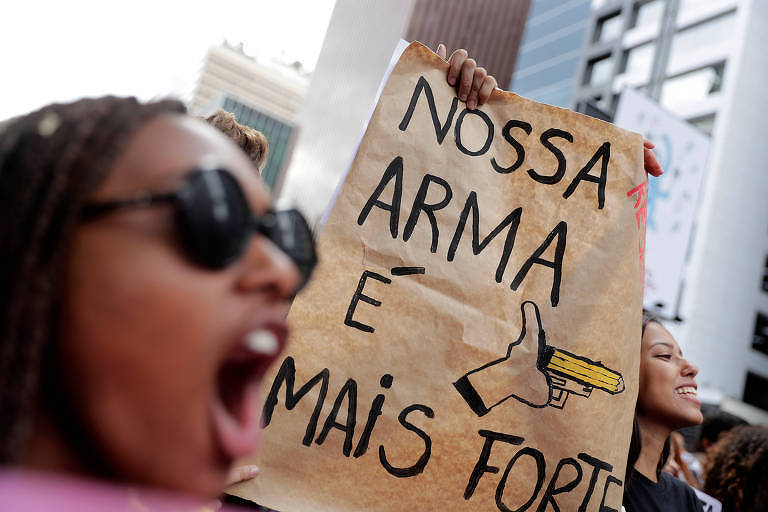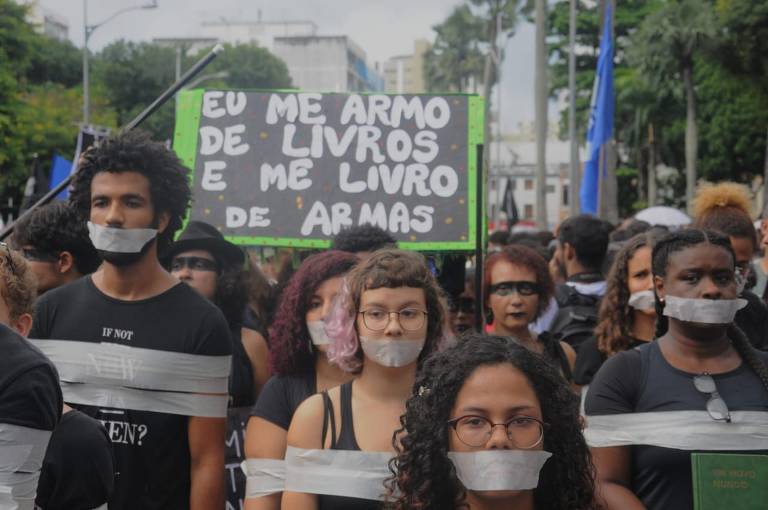Thousands of people in Brazil took to the streets in at least 170 cities to protests against proposed federal education budget cuts. President Jair Bolsonaro, speaking from Dallas, Texas, called the protesters imbeciles, and said they were "useful idiots " being used by a "sly minority. "
Protesters occupied streets and avenues in all state capitals and the federal district, as well as 130 other cities. They marched in small towns like Felipe Guerra (RN), with 5,734 people, as well as the indigenous territory of Alto Rio Negro, at the border between Amazonas and Colombia.
The demonstrators included members of unions opposed to social security reform and students and teachers from public and private universities.
There were also politicians and militants from leftist parties, some people carrying signs that read "Lula Livre," — free Lula. However, thousands of other demonstrators, from children to the old, didn't express any connection to any groups. For many, participation in the protest was a spontaneous act similar to the 2013 protests.
In São Paulo, students from surrounding cities chartered buses to Paulista Avenue. High school students at state schools in Itaquaquecetuba fundraised enough money with their parents and teachers to rent five busses. "They organized it and asked for our help to come here," said Marcos Santos de Souza, 40, a history teacher.
Protest posters, many on sulfite paper, varied in the subjects they boldly addressed. Some referred to the Bolsonaro's recent relaxation of gun rules ("less arms and more education").
Others took on a recent statement by education minister Abraham Weintraub in which he initially blamed the education cuts on "unorganized" students and campuses that were full of landless movement and naked people.
Since then, Weintraub admitted that the budget cuts would be applied to all federal education owing to the state of the economy. This could change if economic conditions improved, he said.
Federal universities will suffer a 30% cut in their discretionary budgets, which includes the cost of electricity and water, and expenses toward outsourced security and cleaning companies, for example. When including university employee and professor salaries, the cuts amount to 3.4 percent.
The president said that the students were "imbeciles" who were being used. "It's natural [that there is a protest], now most of them are militants, they have nothing in their heads if you ask them what seven times eight is, they do not know. If you ask for the water formula, they do not know; they do not know anything," he said.
"They are useful idiots, imbeciles, who are being used by the maneuvering mass of a smart little minority that makes up the nucleus of many federal universities in Brazil."
In São Paulo, Fernando Haddad (PT), the candidate for president who defeated by Bolsonaro in the second round, said that the president chose education "as a target."
"We have more than a million people on the streets today for education in the country, and President Bolsonaro is in Texas, the homeland he has chosen to serve," he said from a sound car organized by trade unions.
At the end of the protest, UNE (National Union of Students) called for a mega-protest throughout Brazil on May 30. "It is the beginning of the bitter taste that the Bolsonaro will feel," said, Marianna Dias, the organization's president.
Translated by Kiratiana Freelon

